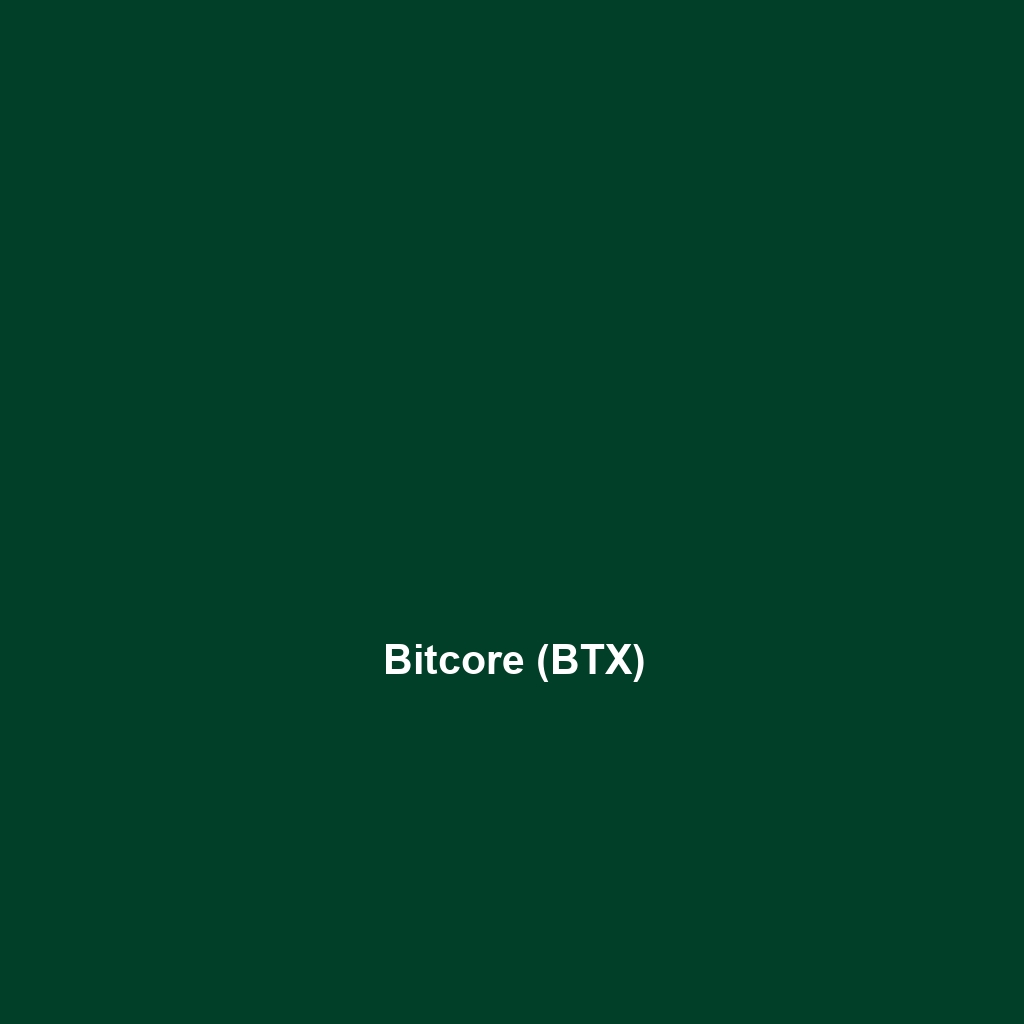Your cart is currently empty!
Bitcore (BTX)

Bitcore (BTX): An In-Depth Overview of the Prominent Cryptocurrency
1. Name and Ticker Symbol: Bitcore, denoted by its ticker symbol BTX, is a notable cryptocurrency within the digital asset landscape. Designed to enhance user experience and cryptocurrency utility, it stands out as a valuable player in blockchain technology.
2. Founders, Launch Date, and History: Bitcore was founded by a team of developers passionate about creating a versatile and robust cryptocurrency. The project was launched in 2017, with its inception aimed at addressing the limitations of earlier cryptocurrencies. Key milestones in Bitcore’s journey include successful wallet releases, network upgrades, and a growing community. Since its launch, Bitcore has made significant progress in evolving its technology and expanding its user base.
3. Blockchain Platform: Bitcore operates on its own blockchain platform, which is primarily a layer 1 solution. This allows it to function independently of other blockchain networks while still leveraging the advantages of decentralized ledger technology. Its architecture is designed for scalability, speed, and robustness, making it well-suited for various use cases.
4. Purpose and Use Case: The primary purpose of Bitcore is to serve as a versatile payment system. It aims to provide fast, secure, and low-cost transactions, making it ideal for both retail use and peer-to-peer transactions. Additionally, Bitcore has potential applications in decentralized finance (DeFi) and payment integrations, enhancing its overall utility in the crypto economy.
5. Technology and Consensus Mechanism: Bitcore utilizes a Proof of Work (PoW) consensus mechanism, which ensures network security and transaction validation through cryptographic puzzles. This technology underpins the integrity of the Bitcore blockchain, making it resistant to certain types of attacks. PoW plays a crucial role in maintaining the decentralized nature of the network and rewarding miners for their contributions.
6. Supply and Tokenomics: The maximum supply of Bitcore is capped at 21 million BTX, aligning with the capped supply model that many cryptocurrencies adopt. The circulating supply currently fluctuates as new coins are mined, and holders can benefit from staking rewards through various platforms. Although there are no established burn mechanisms within Bitcore’s tokenomics, the capped supply model inherently reduces the inflation rate over time.
7. Use Cases and Adoption: Bitcore has found several applications in the real world, especially in making transactions faster and cheaper compared to traditional banking systems. Additionally, partnerships with e-commerce platforms and payment systems have bolstered adoption, leading to increased usability in online commerce and transactions.
8. Market Performance and Metrics: As of late 2023, Bitcore’s market capitalization reflects its position in the cryptocurrency marketplace, featuring fluctuating price trends that showcase both growth and volatility. Historical data indicate periods of substantial trading volume, revealing the investment interest and trading activity surrounding BTX.
9. Where to Buy and Trade: Bitcore is available on various centralized exchanges (CEXs) like TradeOgre, and some decentralized exchanges (DEXs). This variety of options allows users to trade BTX conveniently, catering to different trading preferences.
10. Security and Risks: Like many cryptocurrencies, Bitcore faces security vulnerabilities that could pose risks to users and investors. While the core technology is robust, users should be aware of potential pitfalls such as phishing attacks and the loss of private keys. Regulatory scrutiny is also a concern, necessitating vigilance concerning compliance with local laws.
11. Community and Governance: The Bitcore community plays a pivotal role in its overall governance structure. Decisions regarding network upgrades and developments are discussed openly within the community. An engaged user base contributes to the evolution and enhancements of the platform through proposals and community-driven initiatives.
12. Competitors and Differentiation: Bitcore competes with other cryptocurrencies, most notably Bitcoin and Bitcoin Cash. Its unique features include faster transaction times and lower fees, which present significant advantages for users seeking efficient alternatives to traditional cryptocurrency transactions.
13. Roadmap and Future Developments: The future of Bitcore includes ongoing updates with enhancements aimed at increasing transaction speeds and scalability. Upcoming partnerships and technological upgrades are anticipated to further develop its ecosystem and user engagement in the crypto space.
14. Wallet Compatibility: Bitcore supports various wallets, including hardware wallets like Ledger and software wallets tailored for user accessibility. These recommended wallets ensure users can securely store and manage their BTX holdings effectively.
15. Regulatory and Compliance Status: Bitcore has navigated the evolving regulatory landscape, ensuring compliance where necessary. However, users are encouraged to stay informed about legal challenges that might affect their transactions and holdings, particularly in jurisdictions with strict crypto regulations.
16. Recent News and Updates: Recent developments in the Bitcore ecosystem include news of partnerships and integrations aimed at enhancing its market presence. Updates to the core technology infrastructure have also rolled out, promising a more seamless user experience.
17. Summary and Call to Action: Bitcore (BTX) presents a compelling opportunity within the cryptocurrency space, characterized by its robust technology, competitive advantages, and community engagement. For anyone interested in exploring a cryptocurrency that emphasizes fast transactions and scalability, Bitcore deserves attention.
For additional insights, visit UpCube.net. For further details, check out the cryptocurrency€„¢s